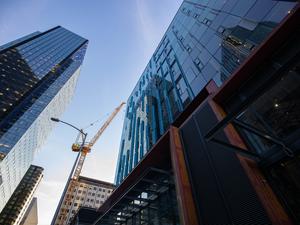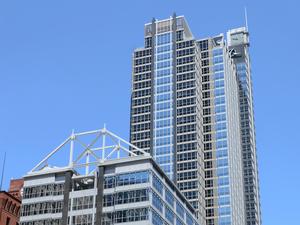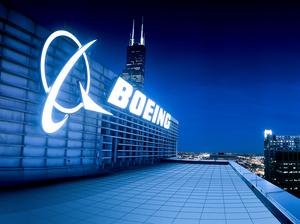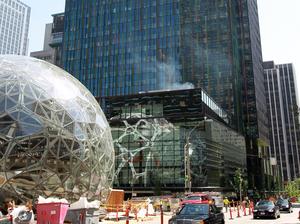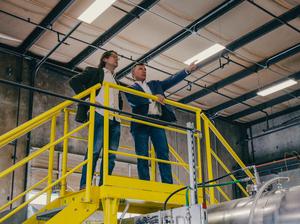On the grass outside the Expedia Group Inc. (Nasdaq: EXPE) headquarters in Interbay, a green laser darts in a random pattern over the open field.
The laser scares away Canada geese, which are notorious for ruining the grass. It is meant to maintain the aesthetic of Expedia’s new office, which opened in 2019.
Outside the building are deck chairs and a long, flowing-water structure built into the ground that glistens over a stone surface, mimicking a natural river. There are Wi-Fi rocks that allow employees to work on the waterfront overlooking Elliott Bay. An herb garden provides key ingredients for signature drinks. A long walkway leading to the main doors and over the fake river completes a resort-like feel.
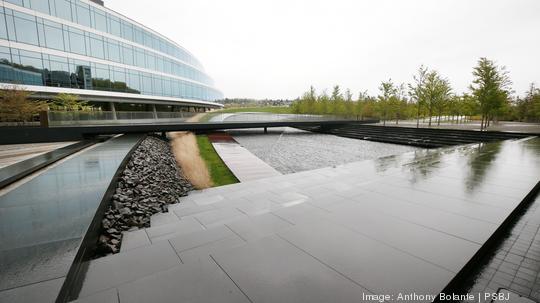
This is what a day at the office looks like before Expedia employees enter roughly 1 million square feet of office space on the 40-plus-acre campus. It is a far cry from Expedia’s former glassy-black headquarters tower in downtown Bellevue.
Between the mass shift to remote employees during the Covid-19 pandemic and the growing number of companies with satellite offices, companies no longer view their headquarters as just a place for employees to work. In a more remote world, a headquarters is all about showcasing the brand and attracting employees.
“We’re about travel. We’re about hospitality. So then shouldn’t our spaces reflect that sort of experience?” said Josh Khanna, Expedia’s director of real estate, sitting in the common area on the ground floor at the Interbay campus. Behind her, full-length windows revealed the outdoor courtyard and an overcast Elliott Bay.
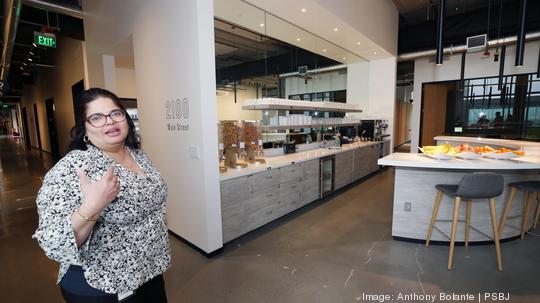
“We have hospitality designers who actually worked on these common areas on the floors to break us out of that, ‘Oh, you could be Anywhere Tech, USA.’ We’re not,” Khanna said. “We’re very much placed and grounded in this site.”
The Interbay office experience is a big bet for the online travel company. Expedia’s campus represents a $900 million investment at a time when the popularity of remote work is soaring. It underscores the value employers place on location even if the bulk of their workforce is elsewhere.
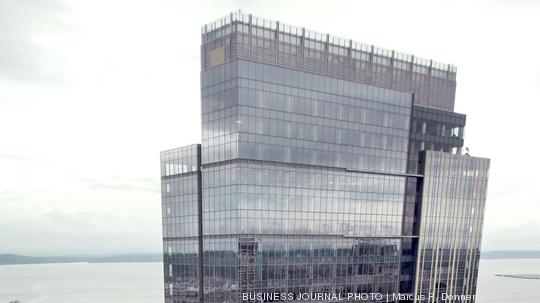
Notable pandemic moves: Not all companies took a wait-and-see approach to their offices during the pandemic. Here are some of the most notable real estate decisions local tech companies made during the past two years:
- Convoy moved from 73,000 square feet of office space in Century Square to over 123,000 square feet of space in Russell Investments Center last year.
- Acumatica moved from 5,000 square feet of space in Bellevue to 8,000 square feet at Yarrow Bay Plaza in Kirkland last year.
- Tanium, which is worth more than $9 billion, moved its official headquarters from the Bay Area to Kirkland in late 2020.
- Los Angeles-based Riot Games bought the 156,000-square-foot Mercer Park Workplace last year. The company will house over 400 employees there when the space opens in 2023.
- Seagen is building a 270,000-square-foot biomanufacturing facility in Everett that is slated to open in 2024 and employ up to 200 workers.
Is it worth the commute?
While most “Seattle-based” companies still have an office here and a nexus of employees, a headquarters location no longer implies a building where most of the workforce convenes five days a week.
For Qualtrics, which has dual headquarters in Utah and Seattle, a headquarters is about creating a destination workplace for employees. The customer-and-employee experience company opened an office in Pioneer Square in 2015 but relocated last year to the new 2+U tower downtown, where it has 175,000 square feet on seven floors plus an additional six floors it subleases out. Qualtrics has about 900 employees in Seattle.
“When you think about a headquarters environment, for us it’s the hub,” said Qualtrics CEO Zig Serafin. “It’s true a lot of your population is in those hubs, but it’s also the place where magic starts to take place. Where people come together to learn and people come to build relationships with each other. It’s where customers show up and where customers actually end up experiencing what the company is about.”
At Highspot, for example, a wall displays the names of all the employees who were at the company when it opened its new headquarters on the Seattle waterfront in 2019. Wall-sized murals at Expedia, like one of a group of people balancing on one another to form a complex human tower, showcase the company’s values. Redfin’s visitors can peruse photo albums documenting the company’s debut on the Nasdaq.
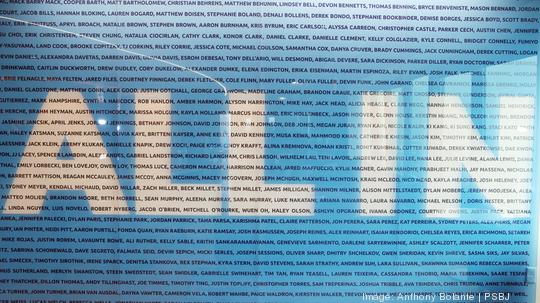
Margaret Day and Chris Perri, executives with the commercial real estate services firm CBRE, are noticing that workers are pickier about where they want to live and work. Whether it’s Walla Walla sweet beet bowls (a menu item at Expedia) or fun all-staff events, a headquarters space plays a role in attracting and retaining employees.
Not only are these spaces a key selling point in the battle for top tech talent, but employers also want to lure current employees away from their home offices.
It’s a technique mastered in Silicon Valley as tech giants like Google and Facebook have sought to make their campuses a dormitory of sorts, complete with on-site laundry, gyms and cafeterias.
Mountain View, California-based Google recently debuted its Kirkland Urban campus, which offers a theater room, a music studio and a play area for dogs. When the remaining phases of the Kirkland Urban campus open in 2023 and 2025, Google’s footprint there will include more than 760,000 square feet of office space, adding to the more than 900,000 square feet it will have in South Lake Union once it opens Block 38 later this year.
“There’s a demand, especially in the tech sector, which is big in Seattle, of how are we going to make their commute worthwhile,” Day said. “When they get there, what is that experience?”
Inside Expedia’s campus, a massive, library-like common area is complete with a coffee bar and movable furniture. The cafeteria menu showcases lunch items like albacore tataki poke bowls, carne asada with spring onions and cilantro rice, and a garlic-ginger eggplant dish with mango chutney. Shopping mall-like directional maps show employees, many of whom have joined post-Covid, how to navigate the massive space. A group plays pingpong in the late afternoon next to foosball tables and an open bottle of Jim Beam. Rows of white smart lockers that employees can access with their badges are peppered throughout the campus.
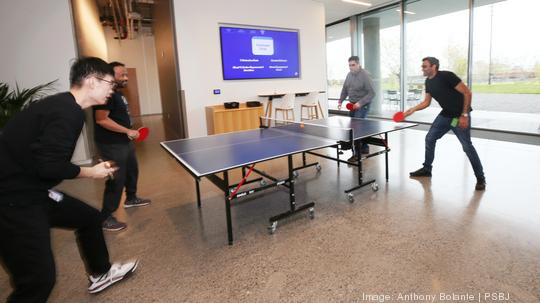
Companies are certainly paying a price to have a physical attraction for employees. According to Kidder Mathews’ first quarter 2022 regional office market report, the average annual office rent in Seattle is $38.85 per square foot. It’s even more expensive on the Eastside, where the average rate is $39.78.
Even the commute is a chance to improve the employee experience. At Expedia, there is a commute team of four people, including two full-time employees. The team helps employees navigate the best way to get from home to the office, with a focus on incentivizing people not to drive.
“They make it really personal,” said Sarah Gavin, senior vice president of global communications and corporate brand at Expedia.
A rundown of the local office market: When it comes to office space, the Eastside is growing in popularity compared with Seattle, according to Kidder Mathews' first quarter 2022 Seattle area market report. Below are some of the most interesting numbers from the report.
- $38.85 average office rent per square foot in Seattle
- $39.78 average office rent per square foot on the Eastside
- $55.15 average office rent per square foot in Bellevue's central business district
- $44.52 average office rent per square foot in Seattle's central business district
- 12.33% office vacancy rate in Seattle
- 10.37% office vacancy rate in Seattle a year ago
- 5.5% Eastside office vacancy rate
- 6.54% Eastside office vacancy rate a year ago
What entices workers to come to the office?
Finding a headquarters near a deep talent pool has always been key for tech companies, but it seems to have outsize importance now.
Perri says the need to have an executive team near the headquarters is secondary to being close to the talent. The thought is executives can work remotely, but the headquarters needs to be near where the workers live or want to live.
“We’ve seen a half-dozen fintechs where we know the executive teams live in a different part of the market or region, but they’re clearly going after mid-rise, high-rise, rail-oriented, transit-oriented projects. (There’s) a high correlation between tech talent and where beer taps flow,” Perri said. “A headquarters search 10 years ago would have presumed 80% of the executive team sitting in the headquarters city. A lot of the companies I see have got distributed leadership teams now.”
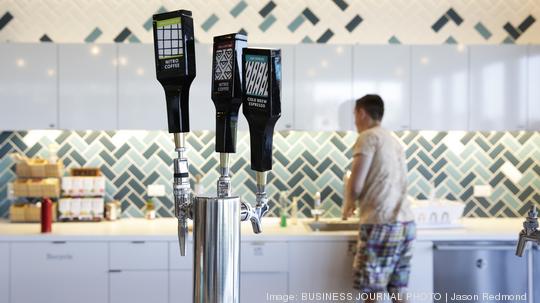
The Seattle area has largely benefited from the desire to be around strong tech talent. Companies like Facebook and Google have spent years hiring in the Puget Sound region to gain talent from the likes of Microsoft and Amazon. A recent report from the IT trade association CompTIA found the Seattle-Tacoma-Bellevue area had 44,618 tech job postings from the start of the year through April, a 40% increase over the same timeframe in 2021 and good enough for seventh out of all U.S. metros.
A single move from a tech giant can have serious ripple effects. When Expedia announced its move away from Bellevue to Seattle, local leaders thought it would portend doom for the Bellevue office market. Then Amazon decided to lease Expedia’s old building, Tower 333, with a plan to add 15,000 jobs to the Eastside city.
T-Mobile then added more office space in Bellevue. Facebook in 2020 paid more than $367 million for three-quarters of REI’s old 8-acre campus in Bellevue. Facebook parent Meta now employs more than 8,800 people in the state of Washington. A January report from the Broderick Group predicted demand will exceed supply in the Eastside office market this year.
Despite the sway of tech giants, in many cases cities are benefitting less from gaining the official headquarters designation. In addition to remote work and social distancing, for many so-called Seattle-area companies, the headquarters is more of a state of mind.
Companies like Temporal and One More Game are fully remote and don’t have office space but still claim Seattle as their headquarters.
Tanium calls itself Kirkland-based after moving to Carillon Point from the Bay Area in 2020, but as of April only about 100 of Tanium’s roughly 2,200-person headcount actually worked there.
Tomo, a real estate fintech startup, is headquartered in Stamford, Connecticut, but has offices in Seattle and Austin, Texas, as well. The company had about 40 employees in Seattle at the time of its $40 million Series A round in March. Co-founder and Chief Revenue Officer Carey Armstrong said the company’s headcount is pretty evenly split across the three cities. The company doesn’t reference any of its offices as the headquarters internally, but Stamford is what it uses for news releases.
“You have to be headquartered somewhere,” Armstrong said.
TaxBit opened an office in South Lake Union last year and now claims dual headquarters between Seattle and Salt Lake City.
Sales Impact Academy calls Seattle its “home base,” choosing to use that term over “headquarters,” as the company is remote-first and doesn’t have permanent office space.
“We’ve got to pick somewhere,” said Tony Jackson, the company’s chief revenue officer.
Even behemoths like Boeing wrestle with the headquarters designation. The aerospace giant recently confirmed plans to move its corporate headquarters from Chicago to Arlington, Virginia, more than 20 years after moving its headquarters from Seattle to Chicago. Despite the double move, Boeing still has about 57,000 employees in the Puget Sound region. It has more than 400 in Chicago.
Still, a headquarters for many companies is more than just a public relations formality. While many companies feel they can create a strong culture through remote work, for others, the physical hub is hard to replace.
That’s especially true for Expedia’s Khanna, who has no problem navigating the new headquarters, a project she was closely involved with. She points out Expedia volunteers who take turns working in highly visible places and guiding other employees around the new space. She talks to the cleaning staff and makes sure they are aware of an event that happened in a conference room earlier in the afternoon. She noticed the catered lunch remnants when walking past it. She talks about how biophilia, what Merriam-Webster defines as “a desire or tendency to commune with nature,” influenced the headquarters.
“Offices, when they are done right, can be an expression and a manifestation of a company’s culture,” Khanna said. “Absolutely there are companies that do it well virtually, but that’s like me saying I want to see a 360 view of the Sistine Chapel and I will die happy. That’s not me. Not going to happen. I want to see it in person.”
